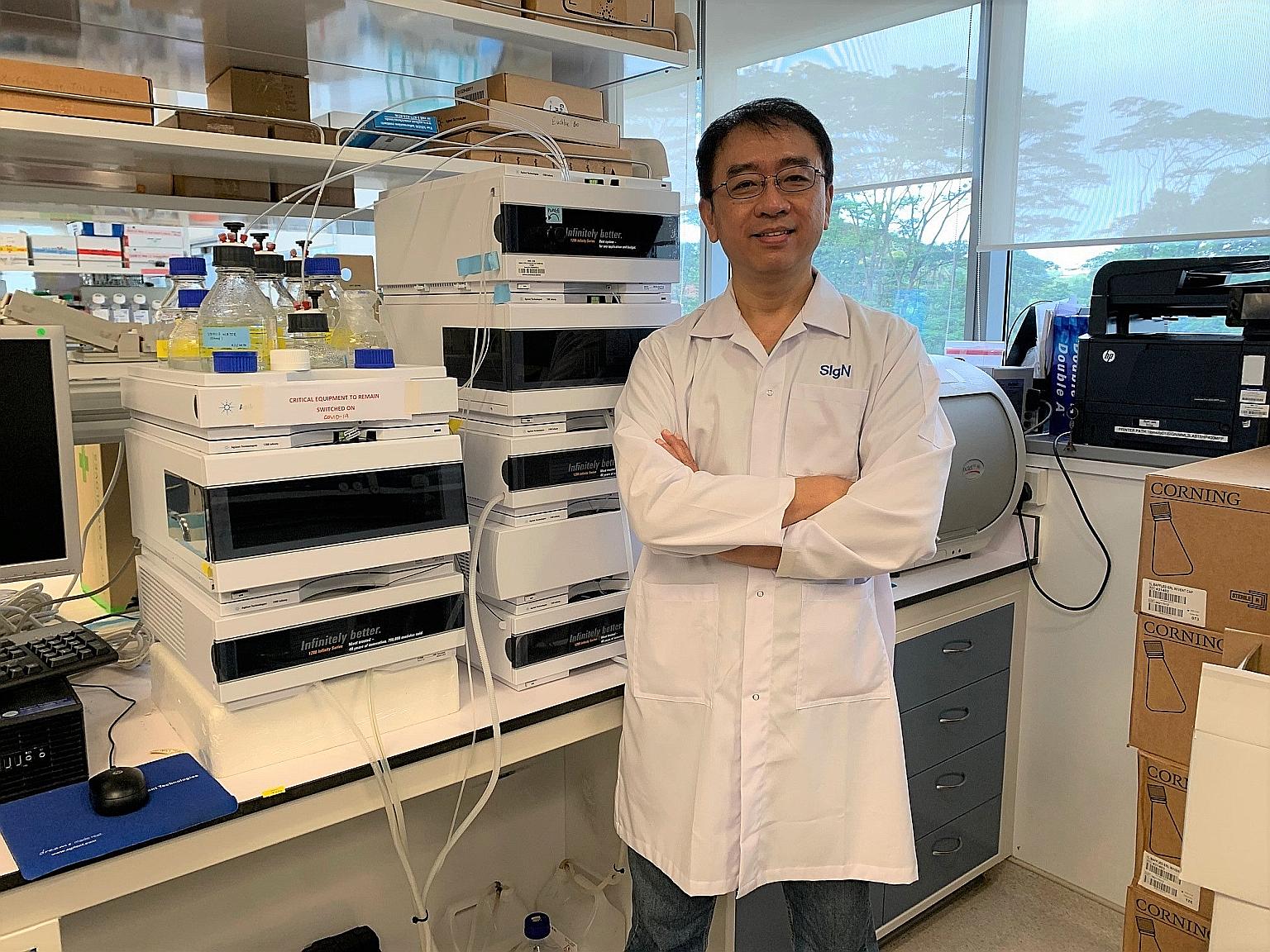Some antibodies may worsen Covid-19, study finds
Effect of these antibodies that prevent virus from infecting cells could impact treatment
Sign up now: Get ST's newsletters delivered to your inbox

A*Star's Dr Wang Cheng-I, one of the authors of the study, says the fact that two types of antibodies - one that inhibits syncytia, a cell fusion linked to lung tissue damage in severe Covid-19 cases, and one that enhances it - can be found in both infected and vaccinated individuals has "profound implications" on how Covid-19 treatments should be designed.
PHOTO: AGENCY FOR SCIENCE, TECHNOLOGY AND RESEARCH
Certain types of Covid-19-neutralising antibodies - which prevent the Sars-CoV-2 virus from infecting a person's cells - may end up worsening the disease, scientists have found.
When the Sars-CoV-2 virus attacks the body, its spike protein binds to a receptor enzyme known as ACE2 in the host cell and, in some instances, causes the viral cell and the host cell membranes to fuse.
This is known as syncytia, and it has been linked to lung tissue damage in severe Covid-19 cases, when the cell fusion occurs inside the airways.
Antibodies block this interaction between the ACE2 receptor and the Sars-CoV-2 virus, and are often tapped for emergency use in early Covid-19 treatment.
Antibodies can be naturally produced by the body after infection, or they can be created in a laboratory. The latter are known as aps monoclonal antibodies.
A team of researchers from the Agency for Science, Technology and Research (A*Star), in collaboration with the QBI Coronavirus Research Group at the University of California, San Francisco, University of Lyon and DSO National Laboratories, discovered that some neutralising antibodies inhibit syncytia, while others drastically enhance it.
Their study findings were published in the scientific journal Cell last month.
For the study, three antibodies, known as 5A6, 2H4 and 3D11, were selected from a pool of 30 billion synthetic human antibodies using a method known as biopanning.
This entails using a viral spike protein as a "bait" to fish out the relevant antibodies that bind to it, said Dr Wang Cheng-I, senior principal investigator at A*Star's Singapore Immunology Network and one of the authors of the study.
The study found that the 5A6 antibody was able to block interactions between the viral spike protein and ACE2 and inhibit syncytia formation, making it a viable candidate for Covid-19 treatment.
Dr Wang said that his team is now actively developing the antibody into a Covid-19 therapeutic.
On the other hand, the 3D11 antibody was found to enhance syncytia, whereas the 2H4 antibody was found to have no significant effect on cell-to-cell fusion.
While a lot more work has to be done to understand what is involved, the fact that the two types of antibodies - one that inhibits syncytia and one that enhances it - can be found in both infected and vaccinated individuals has "profound implications" on how Covid-19 treatments should be designed, said Dr Wang.
This is especially important, given the "ever-mutating nature" of the Sars-CoV-2 virus, he added.
Thus, pharmaceutical companies creating antibodies for Covid-19 treatment should also test their antibodies for syncytia to avoid worsening Covid-19, said Dr Wang.
Local biotech firm Tychan is among the companies developing monoclonal antibodies for treatment against Covid-19.
Since last December, 1,305 Covid-19 patients have taken part in the final phase of clinical trials for its immune system protein TY027.
Asked if the research findings will be taken into consideration by the company for its clinical trials, Tychan co-founder Ooi Eng Eong said the paper is interesting, but laboratory observations do not directly correlate with clinical outcomes. He added that the trial is still ongoing, without any safety concerns.
If the clinical trials are successful, the antibody will be submitted for review by the Health Sciences Authority and other regulatory agencies as a new drug.
In June last year, DSO National Laboratories had found five neutralising antibodies that could help the body fight against Covid-19.
Clinical trials were then set to begin for the most promising of the five - AODO1 - once approval was obtained from HSA.
When asked if human trials have commenced and if the antibodies will be tested for syncytia, a DSO spokesman said more updates will be given later.


